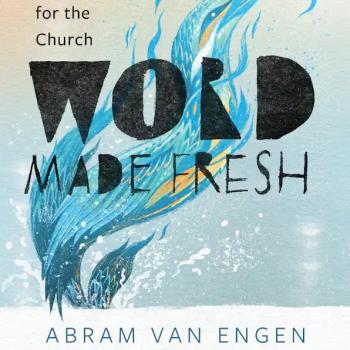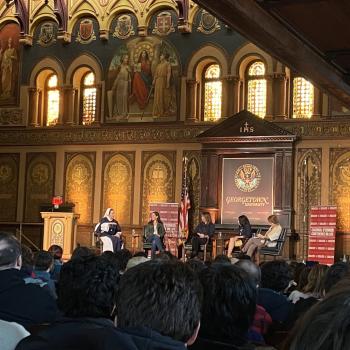Lectionary Reflections
Isaiah 9:2-7
Christmas Eve
December 24, 2014
That great theologian, Mark Twain, once said, "Familiarity breeds contempt — and children!" He was right in both cases, I suppose, but I would add that familiarity also sometimes breeds indifference. We have heard all that before. "The people who walked in darkness have seen a great light," sings Isaiah 9:2, as we hold up our Advent candles, illuminating our faces with that special waxen glow. On Christmas Eve, it is fairly easy to bask in that sort of light in our sanctuary's darkness.
I have sung in church choirs most of my life, and let me admit that as I raise my candle for the final service of the day, I feel something more like relief that another choir call has ended. How hard it is to worship genuinely when you are scrambling for notes and rhythms of whatever demonically difficult piece the demented director has chosen this year. Also, it is past midnight, and the kids are themselves demonic with a chocolate buzz and emotions raw in the hopes that this year, at last, old Santa will fulfill their very wildest desires. When I blow my candle out, and scrape excess wax from my slightly singed fingers, the darkness returns with a rush, and I wonder whether the darkness is not the final word after all.
If I sound a bit melancholy, I suppose I am. I awoke this morning, grabbed my newspaper from the front lawn (yes, Virginia, I still read one of those — any of you under the age of thirty, please call your parents and ask what a print newspaper is!), and read that some Taliban militants had stormed a school in Peshawar, Pakistan, and systematically murdered some one hundred thirty students and teachers, leaving many more critically injured. All nine of the killers died in a hail of bullets from Pakistani police, thus achieving the martyrdom that each had obviously sought. Here is darkness of a most terrible kind, a sort of "deep darkness" that Isaiah says we have lived in. I fear his verb tense is wrong; we in fact still live in such darkness now, and no amount of romantic cant about light will easily dispel it. My Christmas Eve candle seems in the face of such horror little more than a tiny flash, as easily blown out as lit.
The 8th-century prophet goes on in his famous song to speak of "joy," the joy of an expanding nation, the joy of a people worshiping before God, a joy as at the harvest, a joy of the division of vast plunder after a successful raid on our enemies. Though that last sermon illustration, the image of victorious troops yucking it up as they divvy up their looted goods, is to say the least rather discordant as an image of joy, we get the point; joy is to be the hallmark of this darkness people as they now bask in the light.
And this light, hymns Isaiah, is the result of the end of oppression, because "the yoke of their burden," the slave's "bar on their shoulders," and the threatening "rod of their oppressors," have all been broken by YHWH, just as victory was found on the "day of Midian," an apparent reference to the absurd victory of Gideon and his tiny band of a hundred over numerous Midianite warriors. The weapons of this victory were fire pots, torches, and trumpets, not a sword or shield in sight (see Judges 6-8). The lack of traditional weaponry in this victory leads the prophet to add this amazing verse to his song: "All the boots of the tramping warriors, and all the blood-soaked battle garments, shall be burned as fuel for the fire" (Is. 9:5). Might it be that next year on Christmas Eve, instead of my safe little candle with its cardboard protector against the sting of melting wax, I should create a bonfire in the middle of the sanctuary, stoked by army fatigues and muddy battle boots? Could that be the light that Isaiah is really hoping for? Perhaps the native clothes of those Taliban killers, their turbans and dusty sandals, could add fuel to the fire, increasing the light in the horror of the darkness?
Suddenly, Isaiah announces the birth of a "child," yeled in Hebrew, usually a young boy, a "son" given to us (Is. 9:6). The identity of this child is not made clear by the prophet; perhaps he does not have anyone in particular in mind. The fact that this child will be called "Wondrous Counselor, Powerful God, Eternal Father, Prince of Peace," suggests strongly that some sort of super king is intended. That supposition is made the stronger by the reference in the next verse to "the throne of David and his kingdom" that the child will make a place of "endless peace," and that he will "establish and uphold" that throne "with justice and righteousness, both now and forever" (Is. 9:7). A reading of the coronation Psalm 72 confirms that the hope for kings in Israel is very like the promise of this child in Isaiah.
It hardly took a seasoned theologian among the early Christians to connect the hope of Isaiah's child with the birth of the child at Bethlehem whom we gather to celebrate on this night. After all, our hope too is for a powerful God who is at the same time Prince of Peace. Is it not past the time when only the evil ones have the power! Where are those whose will for peace is matched by their power to effect it? Where are those who will stand for justice and righteousness as the means of living in the world and who possess the authority to make it stick? Must the Taliban and ISIS and their right-wing nutcase brothers and sisters in the West, who kill to make a point, who murder and maim in the name of some murky ideology cloaked as religion, continue to plunge the world into the deepest darkness? Would that we could add their manifestoes and pronouncements and bullets and bombs to the raging fire in our Christmas Eve sanctuaries, thus bringing light to our and their darkness, and bringing to an end once and for all the darkness that envelopes us all this Christmas and every Christmas since that murdering Herod tried to plunge the world into darkness by killing all the sons born at the time of Jesus.




